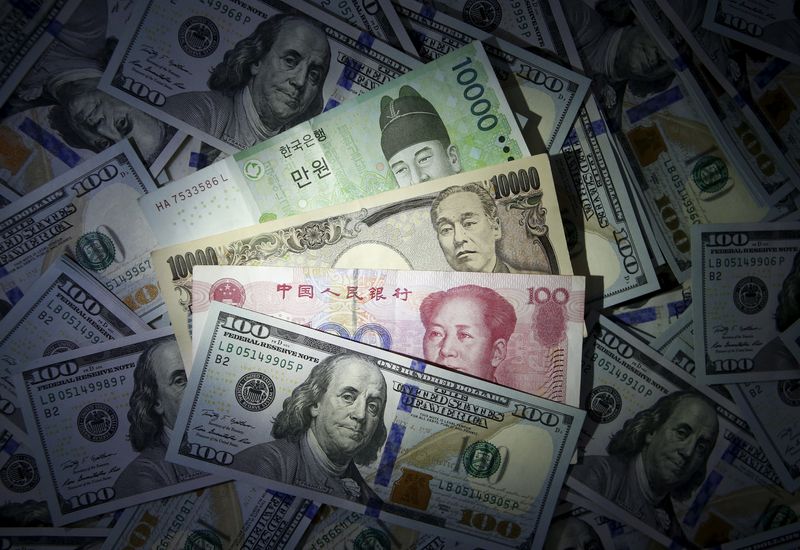Foreign investors boost Asian bond buys in November amid US rate cut signals
2023.12.13 03:19

© Reuters. South Korean won, Chinese yuan and Japanese yen notes are seen on U.S. 100 dollar notes in this picture illustration taken in Seoul, South Korea, December 15, 2015. REUTERS/Kim Hong-Ji/File Photo
(Reuters) – Foreign investors significantly increased their bond purchases in key Asian markets in November, driven by a notable drop in U.S. Treasury yields and a shift in expectations for potential Federal Reserve rate cuts.
Foreign investors made their largest monthly net purchase since May, buying a total of $6.36 billion in South Korean, Indian, Malaysian, Indonesian, and Thai bonds last month, their biggest monthly net buying since May, according to data from regulatory authorities and bond market associations.
The surge in Asian bond purchases in November coincided with a sharp fall in U.S. Treasury yields, following less hawkish remarks from Federal Reserve officials and cooler-than-expected October inflation data, as markets began to anticipate potential Fed rate cuts as early as March 2024.
Indian bonds attracted $1.78 billion in foreign capital, marking the highest inflow since August 2017, spurred by optimistic economic growth forecasts and the inclusion of local bonds in JP Morgan’s emerging market debt index next year.
South Korean bonds saw the first net purchase in four months, amounting to $1.72 billion, bolstered by improving exports that signalled economic resilience. South Korea’s exports exceeded expectations in November, with chip sales rising for the first time in 16 months amid a global demand uptick.
Exports from other regional economies, including China and Taiwan, also expanded last month, fuelling hopes for an economic rebound.
Indonesian, Malaysian, and Thai bonds also saw significant foreign inflows, attracting $1.5 billion, $1.16 billion and $202 million, respectively.
“Overall, portfolio flows into emerging Asia are set for a recovery on the back of improving fundamentals and an end to the US rate hike cycle,” Khoon Goh, head of Asia Research at ANZ.
“The technology-driven economies, South Korea and Taiwan, will benefit the most over the near term.”








